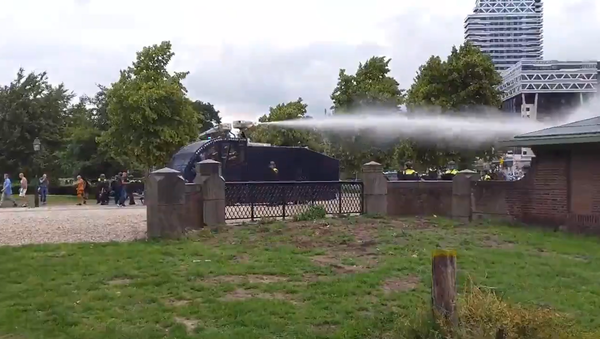Malieveld is an area known for hosting large festivals, picnics and rallies. On Saturday the venue hosted a Black Lives Matter protest against a new police law. The law, currently being reviewed by the Senate, will give police more rights to use force, including lethal force.
Media reports show that the event ended peacefully, with police agents showing no aggression toward participants. When anti-lockdown activists calling for the lifting of coronavirus-related restrictions in the Netherlands rallied for their cause on the next day, however, the Hague authorities said that a massive event would be a threat to public health, stressing that it violates a ban on public gatherings which is in effect until 1 September.
Thousands of people, among them women, children and the elderly, showed up for the Sunday rally, as police used physical force to disperse the crowd.
This video from the Yellow Vests NL shows police agents pushing an elderly man and hitting their former colleague – an ex-police officer, with a baton. In another video this former policeman is saying “What happened here is unbelievable” https://t.co/MLHqyIez4u
— Denis Bolotsky (@BolotskySputnik) June 21, 2020
Some media outlets claimed that police agents were provoked by "trouble makers", also described as "football supporters", who threw stones and smoke bombs at officers. Eyewitnesses pointed out that the standoff, which may have triggered the police aggression, happened not at the protest venue itself, but at a nearby railway station.
According to Patrick Savalle – a Dutch blogger who filmed Sunday’s rally and was targeted by a water cannon, for the thousands who peacefully rallied in Malieveld, the tough police actions were unexpected and unprovoked.
Watch the first seconds of this video. Dutch riot police was charging at a crowd that included children and elderly people.
— ᴢᴀᴘʀᴜᴅᴇʀ ɪɴᴄ (@patricksavalle) June 21, 2020
Without any warning. Without any instructions.
You can be sure this police force will be happy to enforce the Orwellian #COVID19 laws we were protesting. https://t.co/9gXkWIxlUP
“It was excessive force, although they didn’t hurt anybody. But it was massive response, and we weren’t warned, or there was no indication of what we should do” said Savalle, adding, “once they started using the water cannon on normal people, and there were children, and there were women – it’s kind of excessive.”
Once the law enforcement agents started encircling the protesters gathered in the field, many ran in fear, with one video showing a police van speeding into the crowd.
POLITIE RIJD DEMONSTRATIE IN MET Bus. #Malieveld #Malieveld21juni pic.twitter.com/HL1khRnwYp
— Gele Hesjes NL (@GeLeHesjesNL) June 21, 2020
Later the Hague police stated that the maneuver was not dangerous and was observed by agents coordinating the operation with the use of an aerial view.
We zien video's voorbijkomen met een busje van de aanhoudingseenheid. De mensen die rennen, proberen zich te onttrekken aan een mogelijke aanhouding. Vanuit de commandoruimte hebben wij van bovenaf gezien dat er voldoende afstand was tussen het busje en de omstanders. #Malieveld
— Politie Den Haag eo (@POL_DenHaag) June 21, 2020
Around four hundred people – mainly those who refused to leave the field, were arrested, and at least five were detained for throwing objects at police near the railway station.
But despite a tough reaction by authorities, many Dutch people are prepared to stand for the cause and are calling for the abolition of the COVID-19 lockdown.
“In my opinion it’s exaggerated.” said Savalle. “The intensive care units are empty. There are no more new cases. RT-PCR measurements are very unreliable. The economy is collapsing, it’s inhuman to be isolated for three months, it’s not realistic anymore.”
According to data collated by the Johns Hopkins University, as of 22 June, the Netherlands had 49,801 confirmed COVID-19 cases and 6109 coronavirus-related deaths.
The country’s government introduced a set of restrictive measures to slow the spread of the virus in mid-March, introducing social distancing regulations, closing restaurants, cafes, gyms, hair salons, schools and child care centers. Flights from China, Iran, Italy, and South Korea, which had the largest number of COVID-19 cases at the time, were suspended.
In May, Dutch authorities announced that the country would go through a four month gradual lift of the lockdown, with the final date set for 1 September. Until that date all public gatherings, including rallies, are prohibited.
At the time of publication, The Hague police did not reply to Sputnik’s request for comment regarding the use of force against protesters.



